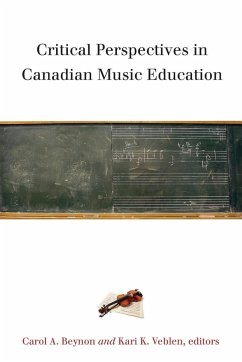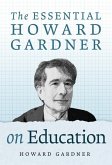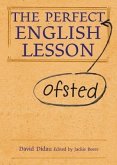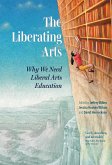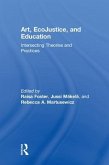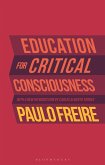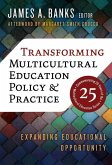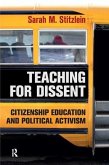Critical Perspectives in Canadian Music Education
Herausgeber: Beynon, Carol A; Veblen, Kari K
Critical Perspectives in Canadian Music Education
Herausgeber: Beynon, Carol A; Veblen, Kari K
- Broschiertes Buch
- Merkliste
- Auf die Merkliste
- Bewerten Bewerten
- Teilen
- Produkt teilen
- Produkterinnerung
- Produkterinnerung
Music education in Canada is a vast enterprise that encompasses teaching and learning in thousands of public and private schools, community groups, and colleges and universities. This book offers a collection of essays that look critically at various global issues in music education from a Canadian perspective.
Andere Kunden interessierten sich auch für
![The Essential Howard Gardner on Education The Essential Howard Gardner on Education]() Howard GardnerThe Essential Howard Gardner on Education48,99 €
Howard GardnerThe Essential Howard Gardner on Education48,99 €![The Perfect (Ofsted) English Lesson The Perfect (Ofsted) English Lesson]() David DidauThe Perfect (Ofsted) English Lesson17,99 €
David DidauThe Perfect (Ofsted) English Lesson17,99 €![The Liberating Arts The Liberating Arts]() The Liberating Arts18,99 €
The Liberating Arts18,99 €![Art, EcoJustice, and Education Art, EcoJustice, and Education]() Art, EcoJustice, and Education123,99 €
Art, EcoJustice, and Education123,99 €![Education for Critical Consciousness Education for Critical Consciousness]() . Paulo FreireEducation for Critical Consciousness23,99 €
. Paulo FreireEducation for Critical Consciousness23,99 €![Transforming Multicultural Education Policy and Practice Transforming Multicultural Education Policy and Practice]() Transforming Multicultural Education Policy and Practice60,99 €
Transforming Multicultural Education Policy and Practice60,99 €![Teaching for Dissent Teaching for Dissent]() Sarah Marie StitzleinTeaching for Dissent59,99 €
Sarah Marie StitzleinTeaching for Dissent59,99 €-
-
-
Music education in Canada is a vast enterprise that encompasses teaching and learning in thousands of public and private schools, community groups, and colleges and universities. This book offers a collection of essays that look critically at various global issues in music education from a Canadian perspective.
Hinweis: Dieser Artikel kann nur an eine deutsche Lieferadresse ausgeliefert werden.
Hinweis: Dieser Artikel kann nur an eine deutsche Lieferadresse ausgeliefert werden.
Produktdetails
- Produktdetails
- Verlag: Wilfrid Laurier University Press
- Seitenzahl: 230
- Erscheinungstermin: 15. März 2012
- Englisch
- Abmessung: 226mm x 150mm x 15mm
- Gewicht: 332g
- ISBN-13: 9781554583669
- ISBN-10: 1554583667
- Artikelnr.: 33814651
- Herstellerkennzeichnung
- Libri GmbH
- Europaallee 1
- 36244 Bad Hersfeld
- 06621 890
- Verlag: Wilfrid Laurier University Press
- Seitenzahl: 230
- Erscheinungstermin: 15. März 2012
- Englisch
- Abmessung: 226mm x 150mm x 15mm
- Gewicht: 332g
- ISBN-13: 9781554583669
- ISBN-10: 1554583667
- Artikelnr.: 33814651
- Herstellerkennzeichnung
- Libri GmbH
- Europaallee 1
- 36244 Bad Hersfeld
- 06621 890
Table of Contents for Critical Perspectives in Canadian Music Education,
edited by Carol A. Beynon and Kari K. Veblen
Foreword: Questioning Traditional Teaching and Learning in Canadian Music
Education R. Murray Schafer
Preface and Acknowledgments Carol Beynon and Kari Veblen
Chapter 1: The âEURoeRootsâEUR? of Canadian Music Education: Expanding Our
Understanding Betty Hanley
Chapter 2: Cross-Country Checkup: A Survey of Music Education in
CanadaâEUR(TM)s Schools Benjamin Bolden
Chapter 3: Canadian Music in Education: âEURoeSounds Like CanadaâEUR?
Patricia Martin Shand
Chapter 4: ManitobaâEUR(TM)s Success Story: What Constitutes Successful
Music Education in the Twenty-First Century? Wayne D. Bowman
Chapter 5: Traditional Indigenous Knowledge: An Ethnographic Study of Its
Application in the Teaching and Learning of Traditional Inuit Drum Dances
in Arviat, Nunavut Mary Piercey
Chapter 6: Looking Back at Choral Music Education in Canada: A Narrative
Perspective Carol Beynon
Chapter 7: Re-Membering Bands in North America: Gendered Paradoxes and
Potentialities Elizabeth Gould
Chapter 8: Community Music Making: Challenging the Stereotypes of
Conventional Music Education Kari Veblen
Chapter 9: Still Wary after All These Years: Popular Music and the School
Music Curriculum June Countryman
Chapter 10: E-Teaching and Learning in Music Education: A Case Study from
Newfoundland and Labrador Andrea Rose, Alex Hickey, and Andrew Mercer
Chapter 11: Focusing on Critical Practice and Insights in the Music Teacher
Education Curriculum Betty Anne Younker
Chapter 12: Marching to the World Beats: Globalization in the Context of
Canadian Music Education Carol Beynon, Kari Veblen, and David Elliott
Chapter 13: Epistemological Spinning: What Do We Really Know about Music
Education in Canada? Carol Beynon, Kari Veblen, and Anne Kinsella
About the Authors
Index
ContributorsâEUR(TM) Bios
Carol Beynon is Associate Vice Provost of the School of Graduate and
Postdoctoral Studies and former Acting Dean of Education at the University
of Western Ontario. She is the founding co-artistic director of the
renowned and award-winning Amabile Boys and Men's Choirs. Her research
focuses on teacher development, teacher identity, and gender issues in
music education; she is the first author of the book Learning to Teach
(Pearson, 2001). She is currently a co-investigator on two federally funded
SSHRC funded projects in music education and singing. Carol was named the
Woman of Excellence in Arts, Culture and Heritage 2007.
Benjamin Bolden, music educator and composer, is an Assistant Professor of
music education at Queen's University. His research interests include the
teaching and learning of composing, community music, and Web 2.0
technologies in education. As a teacher, Ben has worked with preschool,
elementary, secondary, and university students in Canada, England, and
Taiwan. An associate composer of the Canadian Music Centre, Ben has seen
his works performed by a variety of professional and amateur performing
ensembles. He is editor of the Canadian Music Educator, official journal of
the Canadian Music Educators' Association/L'Association canadienne des
musiciens éducateurs.
Wayne D. Bowman's work is extensively informed by pragmatism, critical
theory, and conceptions of music and music education as social practices.
He is particularly concerned with music's socio-political power and
ethically informed understandings of musical practice. His publications
include Philosophical Perspectives on Music (1998), the Oxford Handbook of
Philosophy in Music Education (2012), numerous book chapters, and articles
in prominent scholarly journals. The former editor of the journal Action,
Criticism, and Theory [ACT] for Music Education, his university teaching
experience includes positions at Brandon University (Manitoba), Mars Hill
College (North Carolina), the University of Toronto, and New York
University.
June Countryman teaches aural skills and music education courses in the
Music Department at UPEI. She holds B.Mus., B.A., and B.Ed. degrees (Mount
Allison), M.Mus. (UWO), and Ed.D (OISE/UT). She has lengthy experience as
an elementary music teacher, a curriculum writer and program consultant,
and a high school choral teacher. Her research interests include
improvisation as a tool for musical growth, children's informal musicking
on school playgrounds, sharing power in teaching contexts, and teacher
professional development. Dr. Countryman was awarded UPEI's Hessian Award
for Teaching Excellence in 2008.
David J. Elliott joined NYU in 2002 after twenty-eight years as Professor
and Chair of Music Education at the University of Toronto. He has also
served as a Visiting Professor of Music Education at Northwestern
University, the University of North Texas, Indiana University, the
University of Cape Town, and the University of Limerick. He is the author
of Music Matters: A New Philosophy of Music Education (1995) and editor of
Praxial Music Education: Reflections and Dialogues (2005/2009). He has
published numerous journal articles and book chapters and presented more
than 200 invited lectures and conference papers worldwide.
Elizabeth Gould serves as Associate Professor at the University of Toronto
Faculty of Music. Her research in gender and sexuality in the context of
feminisms and queer theory has been published widely, including Philosophy
of Music Education Review, Women and Music: A Journal of Gender and
Culture, Educational Philosophy and Theory, and the Brazilian journal
labrys: études féministes estudos feministas. She served as lead editor
for the book Exploring Social Justice: How Music Education Might Matter
(2009) and organized the conference musica ficta: A Conference on
Engagements and Exclusions in Music, Education, and the Arts (2008).
Betty Hanley is Professor Emeritus at the University of Victoria, BC,
Canada. An outstanding contributor to arts and music education in Canada,
Dr. Hanley has organized symposia and conferences, written and edited
books, and conducted research in music pedagogy and arts policy. She has
published articles in the Canadian Music Educator, British Journal of Music
Education, Arts Education Policy Review, Canadian Journal of Education,
International Journal of Community Music, Journal of Music Teacher
Education, and Journal of the Canadian Association for Curriculum Studies.
She is an honorary member of the Canadian Music Educators Association and
has received its Jubilate Award.
Alex Hickey has a broad scope of experience in K-12 education and teaches
part-time in the Faculty of Education at Memorial University. He has worked
as a sole-charge teacher in a one-room school, as a high school art
teacher, as an art and technology education coordinator at the school
district level, and as a curriculum consultant at Department of Education.
He is a former Director of Program Development (English and French) for the
Department of Education in Newfoundland and Labrador and is currently
Coordinator of the Virtual Teacher Centre, an online professional
development entity for teachers. Alex is a practising visual artist with a
fascination for digital technology, media education, and peering over the
horizon of invisibility.
Elizabeth Anne Kinsella is Associate Professor in the Faculty of Health
Sciences and the Faculty of Education at the University of Western Ontario,
Canada. Her work draws on social science perspectives in the study of
professional education and practice, with a particular focus on the health
professions, epistemologies of practice, and reflexivity in professional
life.
Andrew Mercer has taught music in Newfoundland and Labrador since 1994 and
has been involved with Internet-based music education since 1995. In 2004
he joined the Centre for Distance Learning and Innovations, where he
pioneered the practice of teaching of high school music via the Internet.
His work on Internet-based music education has been featured in Canadian
Music Educator, Popular Science, The Wall Street Journal, CNN, Nippon TV,
and elsewhere. He has presented his work on web-based music education at
numerous conferences, including the 2008 ISME Conference, the MTNA National
Conference, and the MENC. Andrew's most recent work explores the
educational uses of such new technologies as Second Life and Apple's
iPhone.
Mary Piercey is a Ph.D candidate in Ethnomusicology at Memorial University
of Newfoundland. Her research explores how the Inuit of Arviat, Nunavut,
use their musical practices to negotiate social diversity within the
community in response to the massive sociocultural changes caused by
resettlement in the 1950s. Ms. Piercey lived and taught music at Qitiqliq
High School in Arviat, Nunavut, founding and directing the Arviat
Imngitingit Community Choir, a mixed-voiced group specializing in
traditional and contemporary Inuit music originating from the Kivalliq
region of Nunavut. Mary now lives in Iqaluit, Nunavut, where she directs
the Inuksuk Drum Dancers and teaches music at Inuksuk High School.
Andrea Rose is Professor of Music Education at the Faculty of Education at
Memorial University of Newfoundland, Canada. Artistic Director of Festival
500 International Choral Festival and Co-Director of The Phenomenon of
Singing International Symposia, Dr. Rose is active as musician, educator,
lecturer, and collaborator. Her primary research interests include the
development of critical pedagogy, leadership, and citizenship in music/
arts education, the nature and role of indigenous music/arts in school
curricula, the development of web-based contexts for music/arts education
and dialogue-based education.
R. Murray Schafer is a noted Canadian composer of interdisciplinary works
performed worldwide. Author, iconoclast, and founder of soundscape ecology,
R. Murray Schaefer has contributed to educational thought and practice.
Murray's books The Composer in the Classroom (1965), Ear Cleaning (1967),
The New Soundscape (1969), The Tuning of the World (1977), A Sound
Education, and The Thinking Ear: On Music Education continue to catalyze
educational thinking in Canada and elsewhere.
Patricia Martin Shand taught at the University of Toronto Faculty of Music
from 1968 to 2011. She has published ten books and more than fifty articles
on Canadian music in education, music curriculum, string pedagogy, and
music performance. She has served on the boards of OMEA, CMEA, and ISME,
and has chaired the ISME Music in Schools and Teacher Education Commission.
She received the Jubilate Award of Merit for outstanding contribution to
music education in Canada, and the Friends of Canadian Music Award for
lifetime achievement in Canadian music scholarship.
Kari Veblen, Assistant Dean of Research, teaches cultural perspectives in
music education, elementary methods, and graduate courses at the Don Wright
Faculty of Music, University of Western Ontario. Musician and educator,
Veblen studies international trends in Community Music. She also pursues a
twenty-five-year fascination with transmission of traditional
Irish/Celtic/diasporic musics. Lectures and learning have taken her
worldwide.
Betty Anne Younker is Dean and Professor of Music Education of the Don
Wright Faculty, University of Western Ontario. Previously, Betty Anne was
Associate Dean for Academic Affairs and Associate Professor of Music
Education at the University of Michigan. Her research interests include
critical and creative thinking within the disciplines of music philosophy
and psychology. Publications include articles in national/international
journals and chapters in several books. Dr. Younker was teacher in band,
choral, and general music settings in the public school system. Presently
she serves on several editorial boards and committees for a variety of
professional organizations.
edited by Carol A. Beynon and Kari K. Veblen
Foreword: Questioning Traditional Teaching and Learning in Canadian Music
Education R. Murray Schafer
Preface and Acknowledgments Carol Beynon and Kari Veblen
Chapter 1: The âEURoeRootsâEUR? of Canadian Music Education: Expanding Our
Understanding Betty Hanley
Chapter 2: Cross-Country Checkup: A Survey of Music Education in
CanadaâEUR(TM)s Schools Benjamin Bolden
Chapter 3: Canadian Music in Education: âEURoeSounds Like CanadaâEUR?
Patricia Martin Shand
Chapter 4: ManitobaâEUR(TM)s Success Story: What Constitutes Successful
Music Education in the Twenty-First Century? Wayne D. Bowman
Chapter 5: Traditional Indigenous Knowledge: An Ethnographic Study of Its
Application in the Teaching and Learning of Traditional Inuit Drum Dances
in Arviat, Nunavut Mary Piercey
Chapter 6: Looking Back at Choral Music Education in Canada: A Narrative
Perspective Carol Beynon
Chapter 7: Re-Membering Bands in North America: Gendered Paradoxes and
Potentialities Elizabeth Gould
Chapter 8: Community Music Making: Challenging the Stereotypes of
Conventional Music Education Kari Veblen
Chapter 9: Still Wary after All These Years: Popular Music and the School
Music Curriculum June Countryman
Chapter 10: E-Teaching and Learning in Music Education: A Case Study from
Newfoundland and Labrador Andrea Rose, Alex Hickey, and Andrew Mercer
Chapter 11: Focusing on Critical Practice and Insights in the Music Teacher
Education Curriculum Betty Anne Younker
Chapter 12: Marching to the World Beats: Globalization in the Context of
Canadian Music Education Carol Beynon, Kari Veblen, and David Elliott
Chapter 13: Epistemological Spinning: What Do We Really Know about Music
Education in Canada? Carol Beynon, Kari Veblen, and Anne Kinsella
About the Authors
Index
ContributorsâEUR(TM) Bios
Carol Beynon is Associate Vice Provost of the School of Graduate and
Postdoctoral Studies and former Acting Dean of Education at the University
of Western Ontario. She is the founding co-artistic director of the
renowned and award-winning Amabile Boys and Men's Choirs. Her research
focuses on teacher development, teacher identity, and gender issues in
music education; she is the first author of the book Learning to Teach
(Pearson, 2001). She is currently a co-investigator on two federally funded
SSHRC funded projects in music education and singing. Carol was named the
Woman of Excellence in Arts, Culture and Heritage 2007.
Benjamin Bolden, music educator and composer, is an Assistant Professor of
music education at Queen's University. His research interests include the
teaching and learning of composing, community music, and Web 2.0
technologies in education. As a teacher, Ben has worked with preschool,
elementary, secondary, and university students in Canada, England, and
Taiwan. An associate composer of the Canadian Music Centre, Ben has seen
his works performed by a variety of professional and amateur performing
ensembles. He is editor of the Canadian Music Educator, official journal of
the Canadian Music Educators' Association/L'Association canadienne des
musiciens éducateurs.
Wayne D. Bowman's work is extensively informed by pragmatism, critical
theory, and conceptions of music and music education as social practices.
He is particularly concerned with music's socio-political power and
ethically informed understandings of musical practice. His publications
include Philosophical Perspectives on Music (1998), the Oxford Handbook of
Philosophy in Music Education (2012), numerous book chapters, and articles
in prominent scholarly journals. The former editor of the journal Action,
Criticism, and Theory [ACT] for Music Education, his university teaching
experience includes positions at Brandon University (Manitoba), Mars Hill
College (North Carolina), the University of Toronto, and New York
University.
June Countryman teaches aural skills and music education courses in the
Music Department at UPEI. She holds B.Mus., B.A., and B.Ed. degrees (Mount
Allison), M.Mus. (UWO), and Ed.D (OISE/UT). She has lengthy experience as
an elementary music teacher, a curriculum writer and program consultant,
and a high school choral teacher. Her research interests include
improvisation as a tool for musical growth, children's informal musicking
on school playgrounds, sharing power in teaching contexts, and teacher
professional development. Dr. Countryman was awarded UPEI's Hessian Award
for Teaching Excellence in 2008.
David J. Elliott joined NYU in 2002 after twenty-eight years as Professor
and Chair of Music Education at the University of Toronto. He has also
served as a Visiting Professor of Music Education at Northwestern
University, the University of North Texas, Indiana University, the
University of Cape Town, and the University of Limerick. He is the author
of Music Matters: A New Philosophy of Music Education (1995) and editor of
Praxial Music Education: Reflections and Dialogues (2005/2009). He has
published numerous journal articles and book chapters and presented more
than 200 invited lectures and conference papers worldwide.
Elizabeth Gould serves as Associate Professor at the University of Toronto
Faculty of Music. Her research in gender and sexuality in the context of
feminisms and queer theory has been published widely, including Philosophy
of Music Education Review, Women and Music: A Journal of Gender and
Culture, Educational Philosophy and Theory, and the Brazilian journal
labrys: études féministes estudos feministas. She served as lead editor
for the book Exploring Social Justice: How Music Education Might Matter
(2009) and organized the conference musica ficta: A Conference on
Engagements and Exclusions in Music, Education, and the Arts (2008).
Betty Hanley is Professor Emeritus at the University of Victoria, BC,
Canada. An outstanding contributor to arts and music education in Canada,
Dr. Hanley has organized symposia and conferences, written and edited
books, and conducted research in music pedagogy and arts policy. She has
published articles in the Canadian Music Educator, British Journal of Music
Education, Arts Education Policy Review, Canadian Journal of Education,
International Journal of Community Music, Journal of Music Teacher
Education, and Journal of the Canadian Association for Curriculum Studies.
She is an honorary member of the Canadian Music Educators Association and
has received its Jubilate Award.
Alex Hickey has a broad scope of experience in K-12 education and teaches
part-time in the Faculty of Education at Memorial University. He has worked
as a sole-charge teacher in a one-room school, as a high school art
teacher, as an art and technology education coordinator at the school
district level, and as a curriculum consultant at Department of Education.
He is a former Director of Program Development (English and French) for the
Department of Education in Newfoundland and Labrador and is currently
Coordinator of the Virtual Teacher Centre, an online professional
development entity for teachers. Alex is a practising visual artist with a
fascination for digital technology, media education, and peering over the
horizon of invisibility.
Elizabeth Anne Kinsella is Associate Professor in the Faculty of Health
Sciences and the Faculty of Education at the University of Western Ontario,
Canada. Her work draws on social science perspectives in the study of
professional education and practice, with a particular focus on the health
professions, epistemologies of practice, and reflexivity in professional
life.
Andrew Mercer has taught music in Newfoundland and Labrador since 1994 and
has been involved with Internet-based music education since 1995. In 2004
he joined the Centre for Distance Learning and Innovations, where he
pioneered the practice of teaching of high school music via the Internet.
His work on Internet-based music education has been featured in Canadian
Music Educator, Popular Science, The Wall Street Journal, CNN, Nippon TV,
and elsewhere. He has presented his work on web-based music education at
numerous conferences, including the 2008 ISME Conference, the MTNA National
Conference, and the MENC. Andrew's most recent work explores the
educational uses of such new technologies as Second Life and Apple's
iPhone.
Mary Piercey is a Ph.D candidate in Ethnomusicology at Memorial University
of Newfoundland. Her research explores how the Inuit of Arviat, Nunavut,
use their musical practices to negotiate social diversity within the
community in response to the massive sociocultural changes caused by
resettlement in the 1950s. Ms. Piercey lived and taught music at Qitiqliq
High School in Arviat, Nunavut, founding and directing the Arviat
Imngitingit Community Choir, a mixed-voiced group specializing in
traditional and contemporary Inuit music originating from the Kivalliq
region of Nunavut. Mary now lives in Iqaluit, Nunavut, where she directs
the Inuksuk Drum Dancers and teaches music at Inuksuk High School.
Andrea Rose is Professor of Music Education at the Faculty of Education at
Memorial University of Newfoundland, Canada. Artistic Director of Festival
500 International Choral Festival and Co-Director of The Phenomenon of
Singing International Symposia, Dr. Rose is active as musician, educator,
lecturer, and collaborator. Her primary research interests include the
development of critical pedagogy, leadership, and citizenship in music/
arts education, the nature and role of indigenous music/arts in school
curricula, the development of web-based contexts for music/arts education
and dialogue-based education.
R. Murray Schafer is a noted Canadian composer of interdisciplinary works
performed worldwide. Author, iconoclast, and founder of soundscape ecology,
R. Murray Schaefer has contributed to educational thought and practice.
Murray's books The Composer in the Classroom (1965), Ear Cleaning (1967),
The New Soundscape (1969), The Tuning of the World (1977), A Sound
Education, and The Thinking Ear: On Music Education continue to catalyze
educational thinking in Canada and elsewhere.
Patricia Martin Shand taught at the University of Toronto Faculty of Music
from 1968 to 2011. She has published ten books and more than fifty articles
on Canadian music in education, music curriculum, string pedagogy, and
music performance. She has served on the boards of OMEA, CMEA, and ISME,
and has chaired the ISME Music in Schools and Teacher Education Commission.
She received the Jubilate Award of Merit for outstanding contribution to
music education in Canada, and the Friends of Canadian Music Award for
lifetime achievement in Canadian music scholarship.
Kari Veblen, Assistant Dean of Research, teaches cultural perspectives in
music education, elementary methods, and graduate courses at the Don Wright
Faculty of Music, University of Western Ontario. Musician and educator,
Veblen studies international trends in Community Music. She also pursues a
twenty-five-year fascination with transmission of traditional
Irish/Celtic/diasporic musics. Lectures and learning have taken her
worldwide.
Betty Anne Younker is Dean and Professor of Music Education of the Don
Wright Faculty, University of Western Ontario. Previously, Betty Anne was
Associate Dean for Academic Affairs and Associate Professor of Music
Education at the University of Michigan. Her research interests include
critical and creative thinking within the disciplines of music philosophy
and psychology. Publications include articles in national/international
journals and chapters in several books. Dr. Younker was teacher in band,
choral, and general music settings in the public school system. Presently
she serves on several editorial boards and committees for a variety of
professional organizations.
Table of Contents for Critical Perspectives in Canadian Music Education,
edited by Carol A. Beynon and Kari K. Veblen
Foreword: Questioning Traditional Teaching and Learning in Canadian Music
Education R. Murray Schafer
Preface and Acknowledgments Carol Beynon and Kari Veblen
Chapter 1: The âEURoeRootsâEUR? of Canadian Music Education: Expanding Our
Understanding Betty Hanley
Chapter 2: Cross-Country Checkup: A Survey of Music Education in
CanadaâEUR(TM)s Schools Benjamin Bolden
Chapter 3: Canadian Music in Education: âEURoeSounds Like CanadaâEUR?
Patricia Martin Shand
Chapter 4: ManitobaâEUR(TM)s Success Story: What Constitutes Successful
Music Education in the Twenty-First Century? Wayne D. Bowman
Chapter 5: Traditional Indigenous Knowledge: An Ethnographic Study of Its
Application in the Teaching and Learning of Traditional Inuit Drum Dances
in Arviat, Nunavut Mary Piercey
Chapter 6: Looking Back at Choral Music Education in Canada: A Narrative
Perspective Carol Beynon
Chapter 7: Re-Membering Bands in North America: Gendered Paradoxes and
Potentialities Elizabeth Gould
Chapter 8: Community Music Making: Challenging the Stereotypes of
Conventional Music Education Kari Veblen
Chapter 9: Still Wary after All These Years: Popular Music and the School
Music Curriculum June Countryman
Chapter 10: E-Teaching and Learning in Music Education: A Case Study from
Newfoundland and Labrador Andrea Rose, Alex Hickey, and Andrew Mercer
Chapter 11: Focusing on Critical Practice and Insights in the Music Teacher
Education Curriculum Betty Anne Younker
Chapter 12: Marching to the World Beats: Globalization in the Context of
Canadian Music Education Carol Beynon, Kari Veblen, and David Elliott
Chapter 13: Epistemological Spinning: What Do We Really Know about Music
Education in Canada? Carol Beynon, Kari Veblen, and Anne Kinsella
About the Authors
Index
ContributorsâEUR(TM) Bios
Carol Beynon is Associate Vice Provost of the School of Graduate and
Postdoctoral Studies and former Acting Dean of Education at the University
of Western Ontario. She is the founding co-artistic director of the
renowned and award-winning Amabile Boys and Men's Choirs. Her research
focuses on teacher development, teacher identity, and gender issues in
music education; she is the first author of the book Learning to Teach
(Pearson, 2001). She is currently a co-investigator on two federally funded
SSHRC funded projects in music education and singing. Carol was named the
Woman of Excellence in Arts, Culture and Heritage 2007.
Benjamin Bolden, music educator and composer, is an Assistant Professor of
music education at Queen's University. His research interests include the
teaching and learning of composing, community music, and Web 2.0
technologies in education. As a teacher, Ben has worked with preschool,
elementary, secondary, and university students in Canada, England, and
Taiwan. An associate composer of the Canadian Music Centre, Ben has seen
his works performed by a variety of professional and amateur performing
ensembles. He is editor of the Canadian Music Educator, official journal of
the Canadian Music Educators' Association/L'Association canadienne des
musiciens éducateurs.
Wayne D. Bowman's work is extensively informed by pragmatism, critical
theory, and conceptions of music and music education as social practices.
He is particularly concerned with music's socio-political power and
ethically informed understandings of musical practice. His publications
include Philosophical Perspectives on Music (1998), the Oxford Handbook of
Philosophy in Music Education (2012), numerous book chapters, and articles
in prominent scholarly journals. The former editor of the journal Action,
Criticism, and Theory [ACT] for Music Education, his university teaching
experience includes positions at Brandon University (Manitoba), Mars Hill
College (North Carolina), the University of Toronto, and New York
University.
June Countryman teaches aural skills and music education courses in the
Music Department at UPEI. She holds B.Mus., B.A., and B.Ed. degrees (Mount
Allison), M.Mus. (UWO), and Ed.D (OISE/UT). She has lengthy experience as
an elementary music teacher, a curriculum writer and program consultant,
and a high school choral teacher. Her research interests include
improvisation as a tool for musical growth, children's informal musicking
on school playgrounds, sharing power in teaching contexts, and teacher
professional development. Dr. Countryman was awarded UPEI's Hessian Award
for Teaching Excellence in 2008.
David J. Elliott joined NYU in 2002 after twenty-eight years as Professor
and Chair of Music Education at the University of Toronto. He has also
served as a Visiting Professor of Music Education at Northwestern
University, the University of North Texas, Indiana University, the
University of Cape Town, and the University of Limerick. He is the author
of Music Matters: A New Philosophy of Music Education (1995) and editor of
Praxial Music Education: Reflections and Dialogues (2005/2009). He has
published numerous journal articles and book chapters and presented more
than 200 invited lectures and conference papers worldwide.
Elizabeth Gould serves as Associate Professor at the University of Toronto
Faculty of Music. Her research in gender and sexuality in the context of
feminisms and queer theory has been published widely, including Philosophy
of Music Education Review, Women and Music: A Journal of Gender and
Culture, Educational Philosophy and Theory, and the Brazilian journal
labrys: études féministes estudos feministas. She served as lead editor
for the book Exploring Social Justice: How Music Education Might Matter
(2009) and organized the conference musica ficta: A Conference on
Engagements and Exclusions in Music, Education, and the Arts (2008).
Betty Hanley is Professor Emeritus at the University of Victoria, BC,
Canada. An outstanding contributor to arts and music education in Canada,
Dr. Hanley has organized symposia and conferences, written and edited
books, and conducted research in music pedagogy and arts policy. She has
published articles in the Canadian Music Educator, British Journal of Music
Education, Arts Education Policy Review, Canadian Journal of Education,
International Journal of Community Music, Journal of Music Teacher
Education, and Journal of the Canadian Association for Curriculum Studies.
She is an honorary member of the Canadian Music Educators Association and
has received its Jubilate Award.
Alex Hickey has a broad scope of experience in K-12 education and teaches
part-time in the Faculty of Education at Memorial University. He has worked
as a sole-charge teacher in a one-room school, as a high school art
teacher, as an art and technology education coordinator at the school
district level, and as a curriculum consultant at Department of Education.
He is a former Director of Program Development (English and French) for the
Department of Education in Newfoundland and Labrador and is currently
Coordinator of the Virtual Teacher Centre, an online professional
development entity for teachers. Alex is a practising visual artist with a
fascination for digital technology, media education, and peering over the
horizon of invisibility.
Elizabeth Anne Kinsella is Associate Professor in the Faculty of Health
Sciences and the Faculty of Education at the University of Western Ontario,
Canada. Her work draws on social science perspectives in the study of
professional education and practice, with a particular focus on the health
professions, epistemologies of practice, and reflexivity in professional
life.
Andrew Mercer has taught music in Newfoundland and Labrador since 1994 and
has been involved with Internet-based music education since 1995. In 2004
he joined the Centre for Distance Learning and Innovations, where he
pioneered the practice of teaching of high school music via the Internet.
His work on Internet-based music education has been featured in Canadian
Music Educator, Popular Science, The Wall Street Journal, CNN, Nippon TV,
and elsewhere. He has presented his work on web-based music education at
numerous conferences, including the 2008 ISME Conference, the MTNA National
Conference, and the MENC. Andrew's most recent work explores the
educational uses of such new technologies as Second Life and Apple's
iPhone.
Mary Piercey is a Ph.D candidate in Ethnomusicology at Memorial University
of Newfoundland. Her research explores how the Inuit of Arviat, Nunavut,
use their musical practices to negotiate social diversity within the
community in response to the massive sociocultural changes caused by
resettlement in the 1950s. Ms. Piercey lived and taught music at Qitiqliq
High School in Arviat, Nunavut, founding and directing the Arviat
Imngitingit Community Choir, a mixed-voiced group specializing in
traditional and contemporary Inuit music originating from the Kivalliq
region of Nunavut. Mary now lives in Iqaluit, Nunavut, where she directs
the Inuksuk Drum Dancers and teaches music at Inuksuk High School.
Andrea Rose is Professor of Music Education at the Faculty of Education at
Memorial University of Newfoundland, Canada. Artistic Director of Festival
500 International Choral Festival and Co-Director of The Phenomenon of
Singing International Symposia, Dr. Rose is active as musician, educator,
lecturer, and collaborator. Her primary research interests include the
development of critical pedagogy, leadership, and citizenship in music/
arts education, the nature and role of indigenous music/arts in school
curricula, the development of web-based contexts for music/arts education
and dialogue-based education.
R. Murray Schafer is a noted Canadian composer of interdisciplinary works
performed worldwide. Author, iconoclast, and founder of soundscape ecology,
R. Murray Schaefer has contributed to educational thought and practice.
Murray's books The Composer in the Classroom (1965), Ear Cleaning (1967),
The New Soundscape (1969), The Tuning of the World (1977), A Sound
Education, and The Thinking Ear: On Music Education continue to catalyze
educational thinking in Canada and elsewhere.
Patricia Martin Shand taught at the University of Toronto Faculty of Music
from 1968 to 2011. She has published ten books and more than fifty articles
on Canadian music in education, music curriculum, string pedagogy, and
music performance. She has served on the boards of OMEA, CMEA, and ISME,
and has chaired the ISME Music in Schools and Teacher Education Commission.
She received the Jubilate Award of Merit for outstanding contribution to
music education in Canada, and the Friends of Canadian Music Award for
lifetime achievement in Canadian music scholarship.
Kari Veblen, Assistant Dean of Research, teaches cultural perspectives in
music education, elementary methods, and graduate courses at the Don Wright
Faculty of Music, University of Western Ontario. Musician and educator,
Veblen studies international trends in Community Music. She also pursues a
twenty-five-year fascination with transmission of traditional
Irish/Celtic/diasporic musics. Lectures and learning have taken her
worldwide.
Betty Anne Younker is Dean and Professor of Music Education of the Don
Wright Faculty, University of Western Ontario. Previously, Betty Anne was
Associate Dean for Academic Affairs and Associate Professor of Music
Education at the University of Michigan. Her research interests include
critical and creative thinking within the disciplines of music philosophy
and psychology. Publications include articles in national/international
journals and chapters in several books. Dr. Younker was teacher in band,
choral, and general music settings in the public school system. Presently
she serves on several editorial boards and committees for a variety of
professional organizations.
edited by Carol A. Beynon and Kari K. Veblen
Foreword: Questioning Traditional Teaching and Learning in Canadian Music
Education R. Murray Schafer
Preface and Acknowledgments Carol Beynon and Kari Veblen
Chapter 1: The âEURoeRootsâEUR? of Canadian Music Education: Expanding Our
Understanding Betty Hanley
Chapter 2: Cross-Country Checkup: A Survey of Music Education in
CanadaâEUR(TM)s Schools Benjamin Bolden
Chapter 3: Canadian Music in Education: âEURoeSounds Like CanadaâEUR?
Patricia Martin Shand
Chapter 4: ManitobaâEUR(TM)s Success Story: What Constitutes Successful
Music Education in the Twenty-First Century? Wayne D. Bowman
Chapter 5: Traditional Indigenous Knowledge: An Ethnographic Study of Its
Application in the Teaching and Learning of Traditional Inuit Drum Dances
in Arviat, Nunavut Mary Piercey
Chapter 6: Looking Back at Choral Music Education in Canada: A Narrative
Perspective Carol Beynon
Chapter 7: Re-Membering Bands in North America: Gendered Paradoxes and
Potentialities Elizabeth Gould
Chapter 8: Community Music Making: Challenging the Stereotypes of
Conventional Music Education Kari Veblen
Chapter 9: Still Wary after All These Years: Popular Music and the School
Music Curriculum June Countryman
Chapter 10: E-Teaching and Learning in Music Education: A Case Study from
Newfoundland and Labrador Andrea Rose, Alex Hickey, and Andrew Mercer
Chapter 11: Focusing on Critical Practice and Insights in the Music Teacher
Education Curriculum Betty Anne Younker
Chapter 12: Marching to the World Beats: Globalization in the Context of
Canadian Music Education Carol Beynon, Kari Veblen, and David Elliott
Chapter 13: Epistemological Spinning: What Do We Really Know about Music
Education in Canada? Carol Beynon, Kari Veblen, and Anne Kinsella
About the Authors
Index
ContributorsâEUR(TM) Bios
Carol Beynon is Associate Vice Provost of the School of Graduate and
Postdoctoral Studies and former Acting Dean of Education at the University
of Western Ontario. She is the founding co-artistic director of the
renowned and award-winning Amabile Boys and Men's Choirs. Her research
focuses on teacher development, teacher identity, and gender issues in
music education; she is the first author of the book Learning to Teach
(Pearson, 2001). She is currently a co-investigator on two federally funded
SSHRC funded projects in music education and singing. Carol was named the
Woman of Excellence in Arts, Culture and Heritage 2007.
Benjamin Bolden, music educator and composer, is an Assistant Professor of
music education at Queen's University. His research interests include the
teaching and learning of composing, community music, and Web 2.0
technologies in education. As a teacher, Ben has worked with preschool,
elementary, secondary, and university students in Canada, England, and
Taiwan. An associate composer of the Canadian Music Centre, Ben has seen
his works performed by a variety of professional and amateur performing
ensembles. He is editor of the Canadian Music Educator, official journal of
the Canadian Music Educators' Association/L'Association canadienne des
musiciens éducateurs.
Wayne D. Bowman's work is extensively informed by pragmatism, critical
theory, and conceptions of music and music education as social practices.
He is particularly concerned with music's socio-political power and
ethically informed understandings of musical practice. His publications
include Philosophical Perspectives on Music (1998), the Oxford Handbook of
Philosophy in Music Education (2012), numerous book chapters, and articles
in prominent scholarly journals. The former editor of the journal Action,
Criticism, and Theory [ACT] for Music Education, his university teaching
experience includes positions at Brandon University (Manitoba), Mars Hill
College (North Carolina), the University of Toronto, and New York
University.
June Countryman teaches aural skills and music education courses in the
Music Department at UPEI. She holds B.Mus., B.A., and B.Ed. degrees (Mount
Allison), M.Mus. (UWO), and Ed.D (OISE/UT). She has lengthy experience as
an elementary music teacher, a curriculum writer and program consultant,
and a high school choral teacher. Her research interests include
improvisation as a tool for musical growth, children's informal musicking
on school playgrounds, sharing power in teaching contexts, and teacher
professional development. Dr. Countryman was awarded UPEI's Hessian Award
for Teaching Excellence in 2008.
David J. Elliott joined NYU in 2002 after twenty-eight years as Professor
and Chair of Music Education at the University of Toronto. He has also
served as a Visiting Professor of Music Education at Northwestern
University, the University of North Texas, Indiana University, the
University of Cape Town, and the University of Limerick. He is the author
of Music Matters: A New Philosophy of Music Education (1995) and editor of
Praxial Music Education: Reflections and Dialogues (2005/2009). He has
published numerous journal articles and book chapters and presented more
than 200 invited lectures and conference papers worldwide.
Elizabeth Gould serves as Associate Professor at the University of Toronto
Faculty of Music. Her research in gender and sexuality in the context of
feminisms and queer theory has been published widely, including Philosophy
of Music Education Review, Women and Music: A Journal of Gender and
Culture, Educational Philosophy and Theory, and the Brazilian journal
labrys: études féministes estudos feministas. She served as lead editor
for the book Exploring Social Justice: How Music Education Might Matter
(2009) and organized the conference musica ficta: A Conference on
Engagements and Exclusions in Music, Education, and the Arts (2008).
Betty Hanley is Professor Emeritus at the University of Victoria, BC,
Canada. An outstanding contributor to arts and music education in Canada,
Dr. Hanley has organized symposia and conferences, written and edited
books, and conducted research in music pedagogy and arts policy. She has
published articles in the Canadian Music Educator, British Journal of Music
Education, Arts Education Policy Review, Canadian Journal of Education,
International Journal of Community Music, Journal of Music Teacher
Education, and Journal of the Canadian Association for Curriculum Studies.
She is an honorary member of the Canadian Music Educators Association and
has received its Jubilate Award.
Alex Hickey has a broad scope of experience in K-12 education and teaches
part-time in the Faculty of Education at Memorial University. He has worked
as a sole-charge teacher in a one-room school, as a high school art
teacher, as an art and technology education coordinator at the school
district level, and as a curriculum consultant at Department of Education.
He is a former Director of Program Development (English and French) for the
Department of Education in Newfoundland and Labrador and is currently
Coordinator of the Virtual Teacher Centre, an online professional
development entity for teachers. Alex is a practising visual artist with a
fascination for digital technology, media education, and peering over the
horizon of invisibility.
Elizabeth Anne Kinsella is Associate Professor in the Faculty of Health
Sciences and the Faculty of Education at the University of Western Ontario,
Canada. Her work draws on social science perspectives in the study of
professional education and practice, with a particular focus on the health
professions, epistemologies of practice, and reflexivity in professional
life.
Andrew Mercer has taught music in Newfoundland and Labrador since 1994 and
has been involved with Internet-based music education since 1995. In 2004
he joined the Centre for Distance Learning and Innovations, where he
pioneered the practice of teaching of high school music via the Internet.
His work on Internet-based music education has been featured in Canadian
Music Educator, Popular Science, The Wall Street Journal, CNN, Nippon TV,
and elsewhere. He has presented his work on web-based music education at
numerous conferences, including the 2008 ISME Conference, the MTNA National
Conference, and the MENC. Andrew's most recent work explores the
educational uses of such new technologies as Second Life and Apple's
iPhone.
Mary Piercey is a Ph.D candidate in Ethnomusicology at Memorial University
of Newfoundland. Her research explores how the Inuit of Arviat, Nunavut,
use their musical practices to negotiate social diversity within the
community in response to the massive sociocultural changes caused by
resettlement in the 1950s. Ms. Piercey lived and taught music at Qitiqliq
High School in Arviat, Nunavut, founding and directing the Arviat
Imngitingit Community Choir, a mixed-voiced group specializing in
traditional and contemporary Inuit music originating from the Kivalliq
region of Nunavut. Mary now lives in Iqaluit, Nunavut, where she directs
the Inuksuk Drum Dancers and teaches music at Inuksuk High School.
Andrea Rose is Professor of Music Education at the Faculty of Education at
Memorial University of Newfoundland, Canada. Artistic Director of Festival
500 International Choral Festival and Co-Director of The Phenomenon of
Singing International Symposia, Dr. Rose is active as musician, educator,
lecturer, and collaborator. Her primary research interests include the
development of critical pedagogy, leadership, and citizenship in music/
arts education, the nature and role of indigenous music/arts in school
curricula, the development of web-based contexts for music/arts education
and dialogue-based education.
R. Murray Schafer is a noted Canadian composer of interdisciplinary works
performed worldwide. Author, iconoclast, and founder of soundscape ecology,
R. Murray Schaefer has contributed to educational thought and practice.
Murray's books The Composer in the Classroom (1965), Ear Cleaning (1967),
The New Soundscape (1969), The Tuning of the World (1977), A Sound
Education, and The Thinking Ear: On Music Education continue to catalyze
educational thinking in Canada and elsewhere.
Patricia Martin Shand taught at the University of Toronto Faculty of Music
from 1968 to 2011. She has published ten books and more than fifty articles
on Canadian music in education, music curriculum, string pedagogy, and
music performance. She has served on the boards of OMEA, CMEA, and ISME,
and has chaired the ISME Music in Schools and Teacher Education Commission.
She received the Jubilate Award of Merit for outstanding contribution to
music education in Canada, and the Friends of Canadian Music Award for
lifetime achievement in Canadian music scholarship.
Kari Veblen, Assistant Dean of Research, teaches cultural perspectives in
music education, elementary methods, and graduate courses at the Don Wright
Faculty of Music, University of Western Ontario. Musician and educator,
Veblen studies international trends in Community Music. She also pursues a
twenty-five-year fascination with transmission of traditional
Irish/Celtic/diasporic musics. Lectures and learning have taken her
worldwide.
Betty Anne Younker is Dean and Professor of Music Education of the Don
Wright Faculty, University of Western Ontario. Previously, Betty Anne was
Associate Dean for Academic Affairs and Associate Professor of Music
Education at the University of Michigan. Her research interests include
critical and creative thinking within the disciplines of music philosophy
and psychology. Publications include articles in national/international
journals and chapters in several books. Dr. Younker was teacher in band,
choral, and general music settings in the public school system. Presently
she serves on several editorial boards and committees for a variety of
professional organizations.

